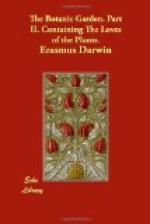With
strange deformity PLANTAGO treads,
A
Monster-birth! and lifts his hundred heads;
Yet
with soft love a gentle belle he charms,
80 And clasps the beauty in his hundred arms.
So
hapless DESDEMONA, fair and young,
Won
by OTHELLO’S captivating tongue,
Sigh’d
o’er each strange and piteous tale, distress’d,
And
sunk enamour’d on his sooty breast.
85 Two gentle shepherds and their sister-wives
With
thee, ANTHOXA! lead ambrosial lives;
[Plantago. l. 77. Rosea. Rose Plantain. In this vegetable monster the bractes, or divisions of the spike, become wonderfully enlarged; and are converted into leaves. The chaffy scales of the calyx in Xeranthemum, and in a species of Dianthus, and the glume in some alpine grasses, and the scales of the ament in the salix rosea, rose willow, grow into leaves; and produce other kinds of monsters. The double flowers become monsters by the multiplication of their petals or nectaries. See note on Alcea.
[Anthoxanthum. l. 83. Vernal grass. Two males, two females. The other grasses have three males and two females. The flowers of this grass give the fragrant scent to hay. I am informed it is frequently viviparous, that is, that it bears sometimes roots or bulbs instead of seeds, which after a time drop off and strike root into the ground. This circumstance is said to obtain in many of the alpine grasses, whose seeds are perpetually devoured by small birds. The Festuca Dometorum, fescue grass of the bushes, produces bulbs from the sheaths of its straw. The Allium Magicum, or magical onion, produces onions on its head, instead of seeds. The Polygonum Viviparum, viviparous bistort, rises about a foot high, with a beautiful spike of flowers, which are succeeded by buds or bulbs, which fall off and take root. There is a bulb, frequently seen on birch-trees, like a bird’s nest, which seems to be a similar attempt of nature, to produce another tree; which falling off might take root in spongy ground.
There is an instance of this double mode of production in the animal kingdom, which is equally extraordinary: the same species of Aphis is viviparous in summer, and oviparous in autumn. A. T. Bladh. Amoen. Acad. V. 7.]
Where
the wide heath in purple pride extends,
And
scatter’d furze its golden lustre blends,
Closed
in a green recess, unenvy’d lot!
90 The blue smoak rises from their turf-built cot;
Bosom’d
in fragrance blush their infant train,
Eye
the warm sun, or drink the silver rain.
The
fair OSMUNDA seeks the silent dell,
The
ivy canopy, and dripping cell;
95 There hid in shades clandestine rites
approves,
Till
the green progeny betrays her loves.
[Osmunda. l. 93. This plant grows on moist rocks; the parts of its flower or its seeds are scarce discernible; whence Linneus has given the name of clandestine marriage to this class. The younger plants are of a beautiful vivid green.]




